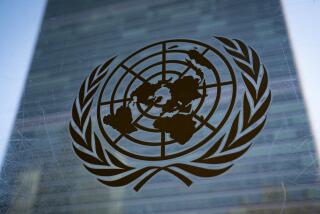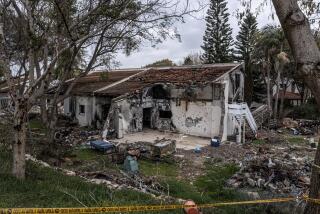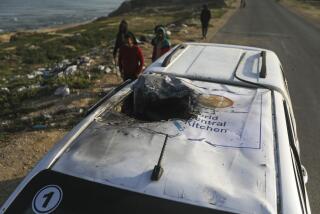Last-Minute Effort to Salvage Jenin Inquiry Fails
UNITED NATIONS — The ill-fated U.N. investigative mission to the Jenin refugee camp in the West Bank will be officially called off today, U.N. Secretary-General Kofi Annan said, citing what he called fundamental and apparently nonnegotiable Israeli objections to the inquiry.
Though Arab nations proposed a draft resolution to the Security Council late Wednesday that would countermand Annan’s move and demand Israeli cooperation with an investigation, the United States appeared poised to veto any such initiative, and other council members voiced support for Annan’s decision.
In a letter presented to council members Wednesday afternoon, Annan said it was his “intention to disband the fact-finding team tomorrow,” and he expressed regret that “the long shadow cast by recent events in the Jenin refugee camp will remain in the absence of such a fact-finding exercise.”
After the Israeli security Cabinet voted Tuesday against cooperation with the United Nations probe--under the terms U.N. officials had negotiated with Israeli representatives here--Annan said in the letter he “was drawn reluctantly to the conclusion” that it would be impossible to produce “an accurate, thorough and balanced report.”
“Clearly, the full cooperation of both sides was a precondition for this, as was a visit to the area itself to see the Jenin refugee camp and at first hand to gather information,” Annan wrote.
Palestinian officials reacted angrily to the cancellation, blaming not Annan but Israeli “recalcitrance,” and they charged again that Israel committed “war crimes” in its three-week occupation of the camp. But Palestinians are beginning to accept estimates from independent human-rights sources that the deaths in Jenin numbered in the scores, not the hundreds.
Nasser Kidwa, the Palestinian representative here, said that although Palestinian officials had said “thousands” of residents were missing from the camp, “missing does not mean killed, obviously.” But Israel’s refusal to permit U.N. aid workers and Red Crescent medical teams into the camp was a violation of international humanitarian law, Kidwa said. “War crimes were committed,” he asserted. “That is an established fact.”
The Israeli ambassador here, Yehuda Lancry, said Wednesday that 47 armed Palestinian men were killed by Israeli troops during the Jenin siege, along with seven Palestinian “civilians”; 23 Israeli soldiers also died, he noted.
“There were no atrocities; there was no massacre; there was a fierce battle between Palestinian gunmen and the Israeli army,” Lancry said.
Earlier Wednesday, the Bush administration said it still supported the Jenin inquiry, which it had first officially endorsed in a U.S.-sponsored Security Council resolution April 13. “The president called for transparency and the president called for the facts to be found,” said Ari Fleischer, White House press secretary. “And the United States is working to try to help reach an agreement between Israel and the United Nations.”
But U.S. diplomats at the U.N. said they would not seek to revive the inquiry once Annan had made a decision to disband the mission.
Some veteran diplomats here who are normally admirers of the secretary-general said privately that Annan and his aides had mishandled the initial organization of the inquiry, and then misread Israeli objections.
By naming a refugee rights advocate and a former Red Cross chief to two of the three executive positions on the team, Annan inadvertently signaled to the Israelis that the group’s focus would be on Palestinian victims and humanitarian aid issues, to the exclusion of the security problems that triggered the Israeli incursion, analysts said.
Israeli misgivings increased when Annan agreed to name William Nash, a retired U.S. major general who runs the Center for Preventive Action at the Council of Foreign Relations, but refused Israeli requests that he be appointed to a leadership role.
“There should have been more consultation with the host government before appointing the members,” said David Philips, Nash’s deputy at the center. “The composition of the initial group created the impression that the mission was being politicized.”
The original call for a U.N. investigation came when hundreds of Israeli troops were still inside the camp, battling Palestinian gunmen and denying access to the scene to journalists, humanitarian aid workers and U.N. officials with administrative responsibility for the camp. The Israeli Defense Ministry itself initially said as many as 200 Palestinians might have died in the fighting.
There was intense pressure on Annan--not just from Arab countries, but from within the U.N. staff here and in the West Bank, U.N. officials said--to undertake a thorough investigation. The specter of “another Srebenica” was raised in the Security Council. The reference had especially unnerving resonance for Annan, who was in charge of U.N. peacekeeping operations at the time of the 1995 massacre in Bosnia-Herzegovina.
“With his own people in the field being affected, he could not simply ignore this,” said one of his aides, who asked not to be named.
More to Read
Sign up for Essential California
The most important California stories and recommendations in your inbox every morning.
You may occasionally receive promotional content from the Los Angeles Times.










